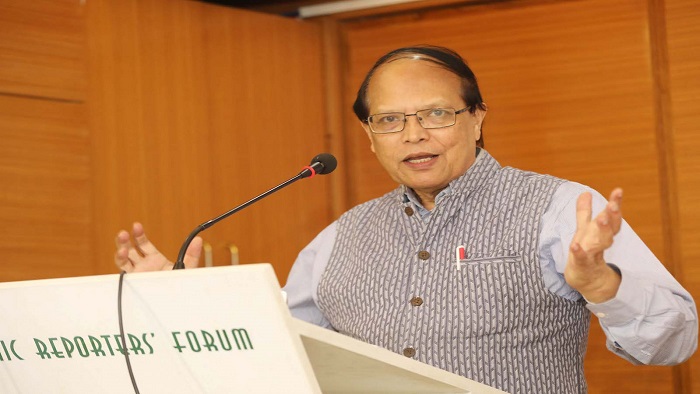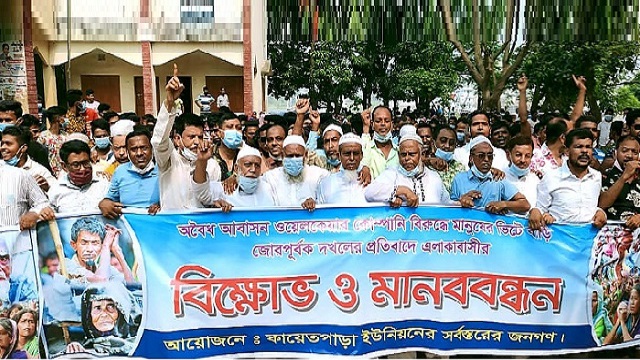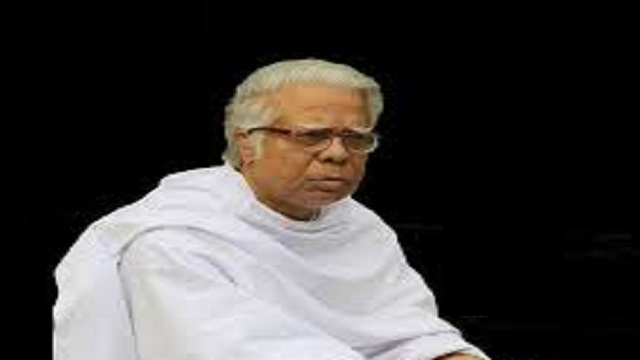Global recession looms large requiring immediate measures
Published:
2022-10-10 09:30:23 BdST
Update:
2024-04-27 09:35:49 BdST

Live Correspondent: Prime Minister Sheikh Hasina addressed a press conference on October 4 marking her recent visit to the UK and USA to attend the funeral of Queen Elizabeth II and UNGA. She read out a written statement. Replying to the queries of journalists, she shed light on a very important aspect.
Quoting the apprehension of many heads of state and international organizations, she said the world is bracing for a serious economic recession next year. The premier made it clear that 2023 will be the year of colossal economic crises. What will be the perils? She said the country may be hit hard by food shortage. So, we have to take preventive measures. She mentioned some way outs calling for proper utilization of every inch of arable lands. She underscored the need for a separate and growing budget for the agricultural sector to face the challenge.
It is difficult for people to survive food insecurity. She saw natural and man-made crises from a close distance and adopted measures to mitigate them. We remember that during the great flood in 1998, she not only provided adequate food and necessary relief to the distressed people like a frontline warrior but also took the initiative to distribute all materials including agricultural loans for recovering the loss to agriculture.
She even ordered the state-owned banks to open banking booths in Hat-Bazar so that farmers can get agricultural loans. Many civil society members feared that millions of people would die in famine caused by the floods. Through efficient relief management, she ensured that not a single person lost their life due to food insecurity. Besides, she made the whole society engaged in the process.
The government's timely agricultural rehabilitation program led to bumper yields of post-flood rice and vegetables. The government did not hesitate to deliver paddy seedlings from one district to another by helicopter. Every department and organization including BADC, the Agricultural Extension Department of the Ministry of Agriculture coordinated all public and private initiatives and created a record of agricultural production. In light of that experience, the farmer-friendly leadership of Bangladesh has been able to implement government policies in a coordinated manner during any subsequent crises.
In addition to providing food, the agriculture sector also provides employment to more than 40 percent of rural people. If agriculture does well, non-agricultural sectors follow the example. Growing modern agriculture also provides the raw material for the industrial sector and the overall domestic demand of the country. As a result, the recession is not evident in the country. In 2009, the global financial crisis also occurred. To deal with the crisis, the Hon'ble Prime Minister adopted an inclusive development strategy with a special focus on agriculture, SMEs, exports, and diaspora income. As a result, the people of Bangladesh did not get a glimpse of the financial crisis. The central bank at that time joined the government's ground-breaking development drive with financial inclusion strategy.
That inclusive development strategy has worked well to counter the economic shock of Covid-19. The government and the central bank jointly adopted a strategy of financial inclusion in the form of incentive programs. Therefore, the economy of Bangladesh has not slowed down at all, rather, Bangladesh has gained a reputation for achieving the most dynamic growth among developing and underdeveloped countries.
Around 6 percent of GDP is covered under these incentives including low-interest loans and social protection programs. Still, Bangladesh has set the wheel of inclusive growth in motion by introducing special refinancing schemes for agriculture and small entrepreneurs.
While the World Bank and the IMF are fixing the growth around the world this year and next year at around 3 percent, those institutions have highlighted in their economic projections that the growth rate of Bangladesh will be more than double in these two years. ADB says a little more than that. Bangladesh hopes that its growth rate will be around 7 percent during this period.
Now, the big challenge is to keep inflation under control. Not only Bangladesh but the whole world is affected by the strong wind of inflation. Food inflation, in particular, is very aggressive. So, people's real income is decreasing and the poverty rate is growing.
The source of this inflation is not internal. Rather, it is partly due to the disruption of international supply chains (especially shipping) due to Covid. Moreover, the Ukraine-Russia war has caused fuel, gas, and edible oil as well as food prices to rise dramatically. Besides, the increase in dollar value has emerged as a blow. The US also poured money into its economy at a massive rate during Covid. Its central bank continues to raise its key policy rate to withdraw that money from the market.
The Fed has already raised the key interest rate by 3 percent. With inflation still above 8 percent in the US, the Fed is not supposed to back away from this strategy of raising policy rates. So, the price of the dollar against other currencies is increasing. The dollar price has already hiked by around 13-14 percent against the basket of currencies of major economies, let alone the currency of a country like ours.
The US bond market is booming and so is the dollar. Even the United Nations has suggested the Fed not raise its policy rate in this situation considering the fear of global economic recession. The victims of this are developing countries with weak economies. Due to the increase in inflation in developed countries, the purchasing power of their buyers is decreasing. It has a negative impact on exporting countries like ours. Bangladesh, mainly known as a textile exporting country, is facing some risk in its foreign exchange earnings.
A large trade deficit had already appeared due to the sudden increase in import costs. However, the Bangladesh Bank and the government have adopted many policies over the past few months to check the import of luxury and less essential goods. Bangladesh has started reaping the benefits of prudent policies such as widening lending margins, closely monitoring high-value LCs, undertaking many austerity programs to reduce dollar consumption, and slowing the pace of implementation of unnecessary development projects.
In order to bring more dollars into the country from expatriates and foreign investors, Bangladesh has taken the initiative of major currency devaluation and easing of regulations. Hence trade deficit and current account deficit have come down considerably in the last three months. Even after a year, the trend of reserve depletion has stopped. Reserves have started increasing again, albeit slowly.
If we move towards a rate acceptable to all, the speed of expatriate and export income will increase. In the coming days, it is expected that the foreign exchange earnings will increase on the one hand and the import cost will decrease on the other. As a result, the dollar-taka exchange rate will stabilize and reserves will gradually increase.
In this context, we have to step very prudently by taking the warning of the Hon’ble Prime Minister about global recession seriously. If some policies are followed, Bangladesh will do better than many countries to deal with this crisis.
In line with the Prime Minister, agriculture should be given importance as the biggest defense. Apart from adequate budgetary support, loans on easy terms, expansion, and marketing support should be provided.
All kinds of policy support should be given to expand agro-based industries and increase exports of agro-processed products.
Small and medium entrepreneurs should be given the necessary capital to expand the non-agricultural sector in changing rural Bangladesh. Bangladesh Bank has undertaken a refinancing scheme of Tk 25,000 crore with low interest for small and medium entrepreneurs. Attention should be increased towards the implementation of it. The central bank can strengthen digital monitoring to see the pace of implementation. An additional Tk 25,000 crore can be kept in the pipeline for the continuation of the program.
Solar irrigation projects should be included in this program. The subsidy provided under the Agricultural Mechanisation Programme should be made applicable to this solar irrigation initiative. Currently, there are about 14,00,000 diesel-powered irrigation pumps. If even half of this amount can be converted to solar, energy import costs will reduce. It will pave the way for adding a new feather to the hat of Bangladesh in dealing with climate change. Farmers' long-term investment will also increase.
To encourage banks to lend to small and medium enterprises, the government has allocated funds for a credit guarantee scheme through Bangladesh Bank. If solar pumps can also be availed under this scheme, the rate of investment in agriculture will increase. The budgetary allocation for this guarantee scheme can be boosted if needed.
The initiative taken by the Bangladesh Bank to provide loans without trade licenses under nano credit and digital finance for small businessmen is certainly commendable. Modern agricultural entrepreneurs should also be given this opportunity.
After agriculture, repatriation income is playing an active role as a major driver in the economy of Bangladesh. Recently, many people are going abroad as expatriate workers. Policy facilities should be ensured so that they can easily send their foreign earnings at reasonable rates. Vigilance should be increased so that the exchange houses do not cheat them. At the same time, the initiative taken by Bangladesh Bank and the law enforcing agencies to uproot the hundi syndicate should be augmented.
In order to bring large-scale expatriate income to the country, various types of investments including investment bonds, treasury bonds, etc., can be facilitated by making digital transactions initiated by Bangladesh Bank available. Sufficient information in this regard should also be given to expatriates. Expats should be encouraged to invest in the medium and long term by quickly removing the complexities related to NID and bond renewal.
In addition to preferential inclusion of expatriates in the public pension scheme, provision of scholarships and stipends should be made to their children first.
Priority can be given to expatriate workers in skill development programs. The National Skill Development Authority can definitely take initiative to include them in special skill development training when they come home on leave or losing jobs.
Expatriates who send remittances and those who bring home money from freelancing have to sell dollars at a lower rate. The demand to give foreign earners the same dollar exchange rate seems reasonable to me. An urgent decision is needed in this regard.
The same applies to exporters. Why should they sell dollars at a lower rate? Why do importers buy dollars at higher prices? We have to create a market-based exchange rate for everyone. India has done it. Why can't we?
Banks that are not able to collect much export or remittance earnings, it becomes very difficult to meet their import liabilities. For that, the central bank needs to instruct to sell dollars within a band around a certain rate for those banks having more foreign currency earnings.
Bangladesh is showing considerable expertise in collecting long-term loans at low-interest rates from international development or financial institutions. Such foreign cooperation should be collected more and more by speeding up the implementation of quality projects. It is better to think ten times before taking a high-interest short-term commercial or hard-term loan.
Efforts should be made to increase foreign direct investment by quickly completing the implementation of Special Economic Zones. The loopholes for easy money laundering abroad must be blocked by increasing the monitoring of commercial financing.
Many more such policy suggestions could be adopted. There is certainly an opportunity to introduce new smart policies by consulting all the stakeholders and reviewing the rules and regulations. Everyone should be patient during this crisis. Nothing can be done to cause panic in the market. We have developed many inclusive development policy strategies in our own country over a long period of time. Relying on these tested policy frameworks, if we proceed with calculations, we will definitely be able to maintain the reputation of Bangladesh's development by facing any recession. Everyone should work together on this.
(The author is an economist and former governor of Bangladesh Bank)
Dhaka, 09 October (campuslive24.com)//BSC
Topic:







Share Your Valuable Comments: